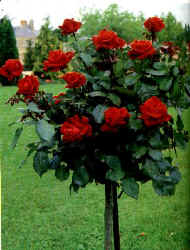Are rose plants easy to grow?
By lalitha55
@lalitha55 (193)
India
7 responses
@spiritwolf52 (2300)
•
13 Feb 07
Roses are easy to grow. The only thing that I do with them is to prune them. I have planted lavender bushes near them to keep the bugs away. If you have trouble with bugs, them just spray them with soapy water and that will do the trick.
@rhinoboy (2129)
•
13 Feb 07
Roses aren't very hard to grow. They do take a lot out of the soil though, so other plants near them may not do very well.
You should use plenty of fertiliser in the soil and keep a check on them for aphid attacks. Greenfly and white-fly have always loved my roses, but there are plenty of sprays available to kill them off. A good spraying every week should protect the new growth.
You should also prune in autumn to avoid the bushes becoming 'woody'.
2 people like this
@nfhs79 (861)
• Malaysia
14 Feb 07
I think nope. Roses need cool and not too sunny area. I think ur area can grow rose plants. :) I like to plant, but my country are in sunny and hot climate. We get roses from up high area like Cameron Highland. It a place much more roses and other flower grows.
@goldream29 (48)
• India
13 Feb 07
hi lalitha, guess roses are the easiest to grow. they do need a lot to eat though! lots and good fertilizer. and they do need sun to flower well but thats about all they will demand of you. but they do need a lot of yearly maintenence if you want to keep the quality of the flowers to remain good.
2 people like this
@Wanderlaugh (1622)
• Australia
18 Feb 07
For beginners, standard roses are the most reliable. There's a very well known variety, the Queen Elizabeth, which is a vigorous rose with large flowers.
Roses need:
1. They like slightly acid soil. If the soil ph is above 6.5 they can have problems. Your local nursery will be able to explain how to test and correct the soil acidity if necessary. Roses are tough, so you won't need to do much more than add a tiny bit of extra phosphate or something similar.
2. Good, well nourished, well prepared, soil that the rose's roots can handle easily. Break up the soil so it's like potting mix.
3. Appropriate rose fertilizer. Seaweed mulch is a good basic all round soil preparation prior to planting and adding the rose fertiliser.
4. Sun and shelter. They do need full sun, but seedlings and flowering plants don't like or need strong winds or excess heat or cold.
5. Mulch, by the ton. Roses are gluttons in the growing season. It's like watching a little kid with a drinking straw.
I see someone else added a few lines about their pests and diseases, I'll just amplify that a bit:
Roses are prone to fungal infections like black spot, and don't like having water splashed on their leaves. Always check in the days after rain to make sure the rose is OK for molds.
Most insect pests can be taken care of with an all purpose spray, there are a few which to work well. No need for major efforts, just make sure you get the spray that does the job.
One thing you do need to watch is that when a rose gets bushy, it starts to create problems for itself because of the denser foliage. Molds and insect numbers can explode. Roses need good air circulation to blow off spores and allow predators to attack pests.
When pruning, the real issue is the shape of the plant, and allowing the rose to open out its main growing stems properly. If you're not used to pruning, you can prune conservatively, and not cut back too severely. You can always do more pruning later, if necessary.
The whole point of pruning is to get new stems forming, and those are the ones that produce the flowers. Generally speaking you need well separated solid stems for good growth. The new growth will follow that basic shape.
Be careful to prune with sterile secateurs, not dirty or used recently for other plants. Diseases can spread directly on to cut stems, and the plant can be at risk.
Roses are quite hardy plants and some can endure almost total neglect, but be sure that you pay attention to any signs of deterioration, like flowers not forming properly, sparse foliage, or other things that just look wrong.
Most of the symptoms of problems are pretty straightforward. Yellowing leaves mean a nitrogen and/or other deficiency, preventing the rose from generating enough foliage. Trace elements are important, particularly during the flowering season, so make sure you know what's required. Always remember to ask for advice if you're not sure.
With basic care, most roses do well, and problems are quite rare.
So grab a few roses, and have fun.











